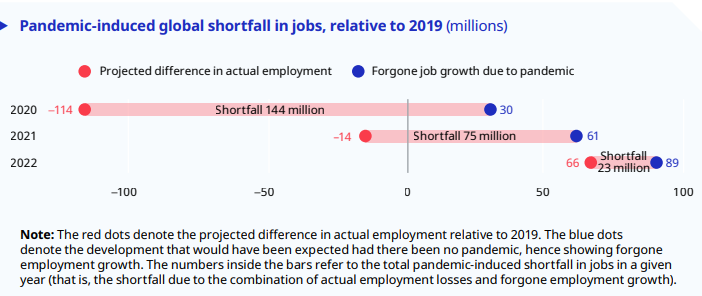World Employment and Social Outlook Trends 2021 Report: ILO | 04 Jun 2021
Why in News
Recently, the International Labour Organisation (ILO) has released the World Employment and Social Outlook: Trends (WESO) report 2021.
Key Points
- Impact of Covid:
- It has pushed over 100 million more workers into poverty worldwide. The world would be 75 million jobs short at the end of this year compared to if the pandemic had not occurred.
- Relative to 2019, an estimated additional 108 million workers are now extremely or moderately poor, meaning that they and their family members are having to live on less than USD 3.20 per day (It is the World Bank poverty line for lower-middle-income countries) in purchasing power parity terms.
- The sharp increase in poverty rates is due to lost working hours as economies went into lockdown, outright job losses, and a decline in access to good quality jobs.
- Five years of progress towards the eradication of working poverty have been undone, as working poverty rates have now reverted to those of 2015.
- Rising Inequality:
- The pandemic has exacerbated existing inequalities in the labour market, with lower-skilled workers, women, young people or migrants among the most affected.
- Loss of Working Hours:
- Many people have held onto their jobs but have seen their working hours cut dramatically.
- In 2020, 8.8% of global working hours were lost compared to the fourth quarter of 2019 -- the equivalent of 255 million full-time jobs.
- While the situation has improved, global working hours have far from bounced back, and the world will still be short the equivalent of 100 million full-time jobs by the end of this year.
- Unemployment Rate:
- Unemployment rate of 6.3% this year (2020-21), falling to 5.7% next year (2021-22) but still up on the pre-pandemic rate of 5.4% in 2019.
- Women’s Unemployment:
- Women have suffered disproportionate job losses while seeing their unpaid working time increase.
- The burden of intensified childcare and homeschooling activities has disproportionately fallen on them.
- As a result, women’s employment dropped by 5% compared with 3.9% for men.
- Effect on Workers:
- There will be pandemic's longer-term “scarring” effects on workers and enterprises.
- Looking ahead, the projected employment growth will be insufficient to close the gaps opened up by the crisis,
- Recommendation:
- Concerted policy efforts are needed to prevent long-lasting damage.
- It recommended among other things ensuring worldwide access to vaccines and financial assistance for developing countries – including through debt restructuring, or enhancing social protection systems.
International Labour Organisation
- About:
- It was created in 1919, as part of the Treaty of Versailles that ended World War I, to reflect the belief that universal and lasting peace can be accomplished only if it is based on social justice.
- It became a specialized agency of the United Nations in 1946.
- It is a tripartite organization, the only one of its kind bringing together representatives of governments, employers and workers in its executive bodies.
- It was created in 1919, as part of the Treaty of Versailles that ended World War I, to reflect the belief that universal and lasting peace can be accomplished only if it is based on social justice.
- Members:
- India is a founding member of the ILO with a total 187 member States.
- In 2020 India assumed the Chairmanship of the Governing Body of ILO.
- Headquarter:
- Geneva in Switzerland.
- Awards:
- In 1969, ILO received the Nobel Peace Prize for improving fraternity and peace among nations, pursuing decent work and justice for workers, and providing technical assistance to other developing nations.
Way forward
- Covid-19 has not just been a public health crisis, it's also been an employment and human crisis.
- Without a deliberate effort to accelerate the creation of decent jobs, and support the most vulnerable members of society and the recovery of the hardest-hit economic sectors, the lingering effects of the pandemic could be with us for years in the form of lost human and economic potential, and higher poverty and inequality.
- There is an urgent need to build back better — create productive employment opportunities and foster long-term labour market prospects for the most vulnerable.

